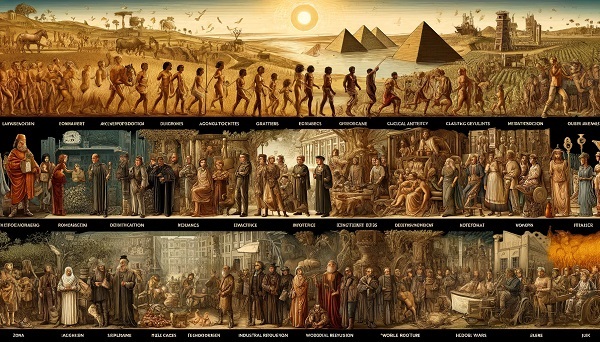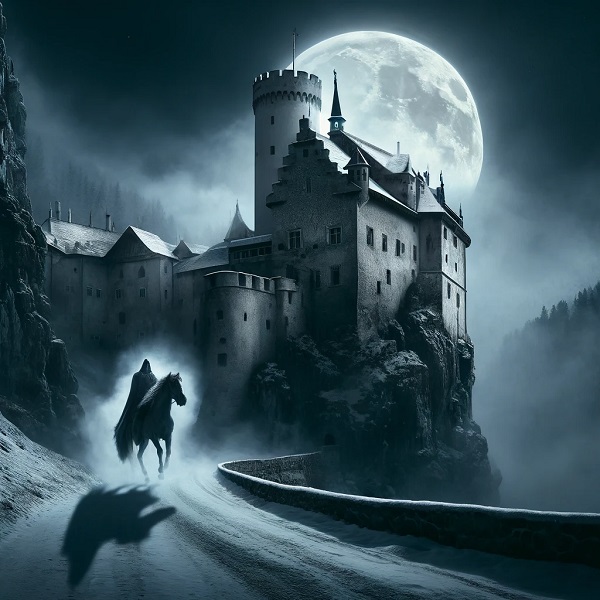
Social and Cultural History
Gersom
- 0
Introduction
Social and cultural history is like a massive mosaic of human existence; they are the tales of how societies have formed and how cultures have connected us. If any of the statements above are true, it is a final indictment of white supremacy and will inspire us to press on in the pursuit of maintaining diversity and countering racism, xenophobia and narrow nationalism. The COVID-19 pandemic has not only killed many, but it has also robbed us of the opportunity to explore and share the origins of identity and community through various forms of arts and culture. As a numbers person, I often dismiss the importance of history but it is always fascinating for me to imagine and imagine the beginnings; I am certain my reluctance is not peculiar. Nevertheless, before you go, please leave a comment and share this essay on social media.
Early Human Societies
For tens of thousands of years, human ancestors lived in small bands of hunter-gatherers, constantly on the move, feeding, staying warm and defending themselves from predators. Cooperation was essential for survival, and beyond that, it was essential to creating a stable, secure environment in which to live.
Hunter-Gatherer Cultures
Think of our forebears fanning out across the plains to stalk elk, roam the marsh for water birds, or chase beasts to drive them over cliffs. Think of these social hunters, living in groups, confronting ancient food sources, and harvesting what the combined experience of the group has long constrained. Life was hard but straightforward, and everyone had a role to play in the survival of the group.
The Agricultural Revolution
And then came the other big game-changer – agriculture. People learned to farm, and by doing so they learned to settle down. The rise of farming permanently changed societies.
Impact on Social Structures
Furthermore, the rise of farming meant that society could produce more food than it needed, which freed up the labor of some members of society to become leaders, artisans or traders without having to dedicate themselves to gathering or hunting. The first civilizations started to emerge.
Development of Settlements
Settlement became permanent, more generally, the urban matrix began to build, what we now call cities. Civilization began.
Ancient Civilizations
Ancient civilizations are the foundation of human history. They invented the laws and cultures we still live under today.
Mesopotamia
After all, the region in antiquity was known as the ‘Cradle of Civilization’. It’s where writing was invented, where we produced our first law codes and epic poem (Gilgamesh). But most importantly, it’s where humanity’s history started in earnest.
Ancient Egypt
The pyramids, the pharaohs — the geometrical mysteries of antiquity! Who doesn’t know of Egypt’s monuments of art, architecture and religion?
Indus Valley Civilization
This lost civilization featured planned cities and elaborate drainage systems, all of which serves as a reminder that great cultures are everywhere, outside of the familiar Western canon.
Classical Antiquity
Shaped by an outpouring of knowledge, democracy and empire-building, the classical era provided the foundations for the modern Western world.
Greece and Democracy
It was Greece that gave us democracy, philosophy and the Olympic games; the thoughts of Socrates, Plato and Aristotle continue to shape our thinking to this day.
The Roman Empire
Rome expanded Greek networks of politics, science and art across Europe, North Africa and the Middle East.
Cultural Achievements
From the Roman road to the Roman aqueduct to the Roman law, the Romans were civilization’s most innovative builders and legislators.
Social Hierarchies
Roman society was a highly stratified society, divided between patrician and plebeian. This formal split extended to all areas of social life, from political structures to daily interactions.
The Middle Ages
Perceived as a time of doom, the Middle Ages were actually a period of great complexity and dynamic change.
Feudalism
This meant that the feudal system of landholding and obligations drove the social politics of that age. The status of lords, vassals and serfs was fixed in a hierarchy apparent in the medieval world.
The Church and Society
The medieval institution that was most fully integrated into every aspect of daily existence and gave meaning to the world, and, indeed, to life itself, was the Church. It was an age in which faith was the lens through which daily existence was lived.
Everyday Life in Medieval Times
For all the disasters, medieval life could be familiar and assured with its seasons, its holidays, its markets and its communal life.
The Renaissance
The Renaissance was a resurrection; a re-emergence of art and culture and of the mind. The world had awoken from a slumber.
Revival of Art and Learning
The masterpieces of artists such as Leonardo da Vinci and Michelangelo, though rooted in the past, continue to awe us today. Scholars recovered for modern readers a wealth of works by ancient authors that opened new worlds to them.
Humanism and Its Influence
Instead, it highlighted human potential and accomplishment, emphasized education and the critical faculty, and favored secular individualism.
Changes in Education
Education became more widespread and varied. Universities flourished, and literacy rates began to climb.
Notable Figures
Among the earliest giants of literature and the arts were Dante, Shakespeare and the Renaissance.
The Enlightenment
Reason, science and the questioning of old certainties became the driving force of the Enlightenment, and this, in turn, paved the way for modernity.
Philosophical Ideas
These thresholds had been reached especially by those who, in the preceding generations, had either joined Voltaire against unrestrained power, had become more enthusiastic for equality by Rousseau’s time, and who had, by Kant’s era, thanked both for acknowledging — that they were translators and thinkers of truth — for the first time ‘man’s predicament and power’.
Social Reforms
Enlightenment ideas spurred social changes, including movements for democracy, human rights, and justice.
The Industrial Revolution
The Industrial Revolution transformed society like never before, bringing about technological advancements and urbanization.
Technological Advancements
Inventions like the steam engine, spinning jenny, and telegraph revolutionized industries and communication.
Urbanization and Society
People migrated to cities for jobs and, as a result, the urban population grew faster than ever before. Urban settings also created new ways of living and working, like crowding and poor working conditions.
The Modern Era
From world wars to the digital age of Google, the 20th and 21st centuries have gone through unprecedented changes.
World Wars and Their Impact
The World Wars re-drew borders, transformed economies, and reshaped societies. They were engines of destruction and innovation.
The Rise of Popular Culture
The modern era has brought mass media, popular culture and entertainment to the world. Hollywood and the internet have created a global experience of culture.
Conclusion
History is not simply a chronological register of dates and occurrences, but a road map about who we might become by way of our social and cultural past. That past is a transporting tale of human experience; it is our oldest inheritance, comprised of both lessons and legacies. Let’s keep on reading.
FAQs
What is social history?
Social history examines the lived experience of people in the past, including their social organization, relationships and everyday activities.
Why is cultural history important?
Cultural history explains values, beliefs, and habits within a given period, describing their nature or their development, their circulation or their status. It can also interpret the relations of mutual influence among different cultures.
How did the Agricultural Revolution change human societies?
Only since the Agricultural Revolution, when we became less mobile animal raisers, has it been possible for humans to settle in a particular spot where they could remain together and advance to more complex societies, social hierarchies and incipient cities.
What were the key achievements of the Roman Empire?
Among its many strengths, the Roman Empire is known for its construction projects, laws and legal inventions, as well as art, literature and governance.
How did the Enlightenment influence modern society?
The rise of the ‘Age of Reason’ promoted the interests of science, reason and the individual, paving the way for social and political reform. enlightenment brought change and laid the foundations of modern democracies.
Samsung Galaxy Z Fold2 LG G8 ThinQ LG V60 ThinQ Samsung Galaxy S21 LG K40 LG V60 ThinQ Samsung Galaxy S21 iPhone 12 Pro Max Samsung Galaxy S21 LG Velvet


